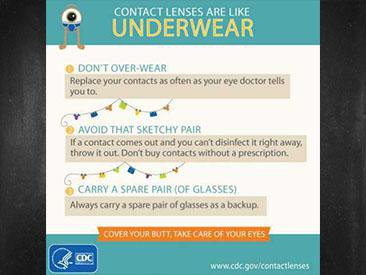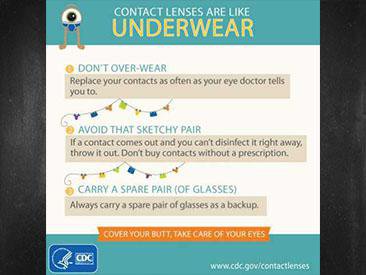Cutting the corners on cleaning your contacts can lead to serious eye infections and, in extreme cases, even blindness, researchers said Thursday.
Roughly a million Americans per year visit their doctors for treatment of keratitis, an eye infection that affects the cornea and can lead to blindness when left untreated, according tonew information from the Centers for Disease Control and Prevention. The agency said this is the first time keratitis has been studied on a large scale in the U.S.
Poor contact lens hygiene, like improper storage case care and sleeping with lenses in, was the most significant risk factor for developing an infection, the CDC reported.
"Contact lenses offer wearers good sight without the hassle of glasses, but they can also make wearers more prone to infection if they’re not careful,” CDC spokeswoman Jennifer R. Cope said in a prepared statement. “Users should follow good hygiene and care steps every time they wear, clean and store their contacts to help keep their eyes healthy."
Keratitis is largely preventable, but causes $175 million in direct healthcare expenditures annually, according to CDC researchers. The average patient seeking treatment for keratisis paid $151 when visiting a doctor’s office or $587 when visiting an emergency department, the CDC study found. Most patients, 76.5 percent, were prescribed antibiotics.
Contact wearers can avoid contracting keratitis by washing their contacts after every use, frequently replacing their contact case, only using fresh contact solution and taking contacts out before sleeping, according to the CDC.
Anyone with eye pain or inflammation should visit a doctor for treatment, according to the CDC. It said cases that are caught early on can typically be easily resolved.
Tips for contact care from the CDC:
1.) Wash hands with soap and water and dry well before touching contact lenses.
2.) Take contacts out before bed, showering or swimming.
3.) Rub and rinse contacts in disinfecting solution each time they remove them.
4.) Rub and rinse the case with contact lens solution, dry with a clean tissue and store upside down with the caps off after each use.
5.) Replace contact lens case at least once every three months.
6.) Don’t “top off” solution in lens case. Use only fresh contact lens solution each time.
7.) Carry a spare pair of glasses in case contacts need to be removed.








